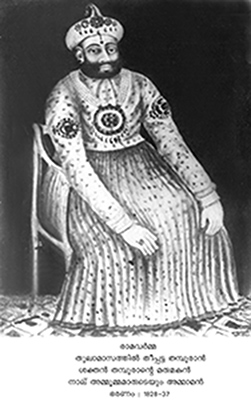Raja Rama Varma who succeeded Raja Vera Kerala Varma was the son of Chittamma Thampuran's daughter Subhdra and therefore nephew of the two previous Rajas.
Correspondence of the times from the British collection of records indicate that he had a total dislike for the two wives / consorts of his uncle. His first act was to stop the handsome allowances that were bestowed on the consorts. Dewan Seshagiri Rao did not endorse the Raja's petty mind set and reported the predicament he was in to the Madras Government. The latter ordered that the allowances to be continued. Raja equated this to treason and gave all kind of trouble to Seshagiri Rao who left the State in sadness.
Seshagiri Rao’s replacement was Edamana Sankara Menon. He proved to be inefficient and corrupt. To enrich himself was his motto. Complaints and petitions from large numbers of people reached the Resident, Colonel Cadogan.
The Resident took no action. Finally representatives of Brahmins, Nayars and Christians took a no confidence memorandum and as a consequence Madras Government forced the Resident to initiate enquires. Cadogan was replaced by Mr. Casamajor, the first civil servant as Resident. After a thorough enquiry, the first Judge of Appeals Court presiding, Menon was criminally convicted of embezzlement. All his property was confiscated. The Raja chose to reduce his jail sentence because of a serious illness,
Venkitasubbayya took over as the Dewan in1835. He was experienced, able and got along well with the Raja, Resident Casamajor and later Resident Major General Fraser. Some of the reforms introduced by him were the following.
1. Wider powers were given to the judiciary to enforce the Hukunamas introduced by Captain Blacker and Nanjappayya earlier.
2. Provided guidance for the Appeals Court.
3. Police officers were placed in Taluks to aid the Tahsildars. Ultimate supervision was vested in the Dewan.
4. Zilla Courts were strengthened.
5. Stamp duty was introduced on documents evidencing sale, mortgage, etc.
6. Just like the wet lands, a survey and settlement of gardens was effected.
7. Conservation of forests which was becoming slack was re-invigorated under Mr. J. Kohlhoff.
8. Reorganized the Dewans office with improved efficiency.
9. The English office was headed by Mr. J.S. Vernade, who continued on for 28 years, probably inculcated the code of official letter writing for Government business.
10. Vernacular schools introduced by Colonel Munro in each Pravrithy was replaced by better schools in each Taluk headquarters.
11. English schools were started in Trichur and Mattanchery and a private English tutor was brought in to teach the Princes.
12. Repeal of gun powder and gun manufacture for hunting purposes was effected. This had been banned from the time of Colonel Macaulay.
Venkitasubbayya got along famously with the Raja. Quietly erasing the vindictiveness he showed to his brother's family, the Raja on his death bed made the Dewan promise that his wife and family will be given enough support by way of pension. He was married to Coonji from the Elamana family. Note that many years later, a Coonji from Elamana family was married to the Raja who ruled from 1932 - 1941
